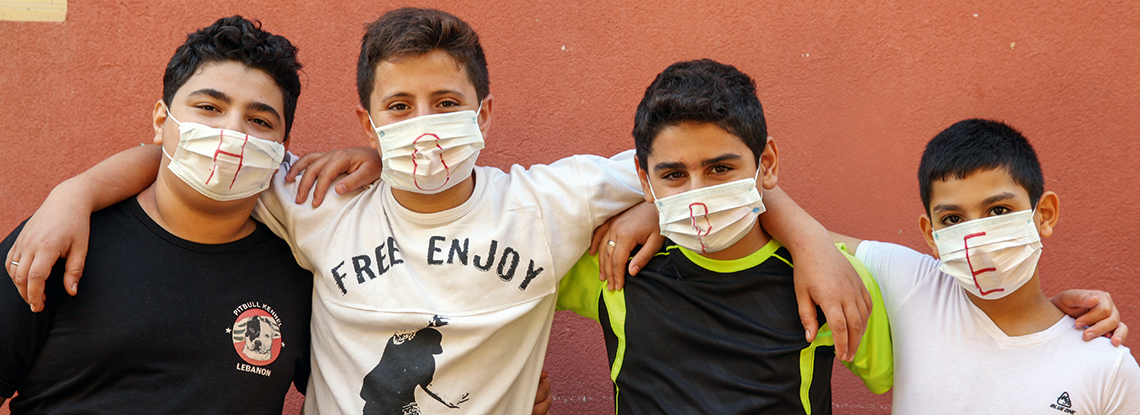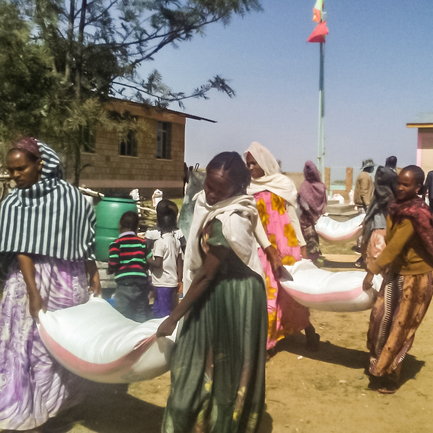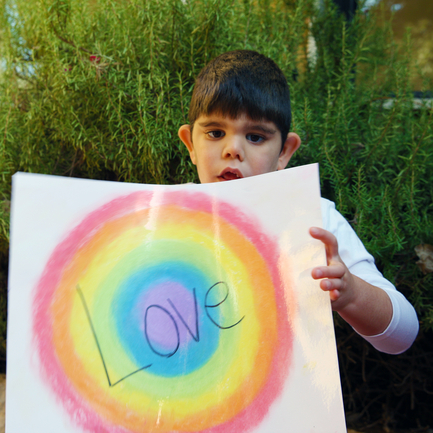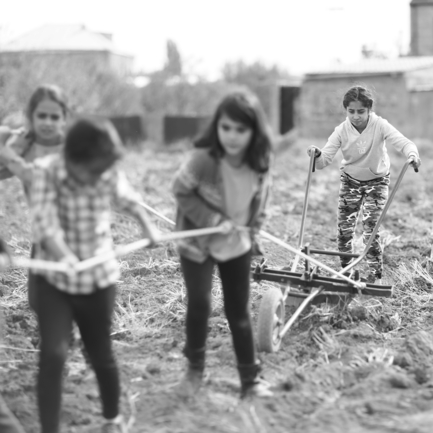
War and catastrophes: Crises within the Corona Crisis
The whole world is affected by the Corona Crisis. As independent schools, Waldorf schools receive no state subsidies, and in many places find themselves in financial difficulties that threaten their very existence. In spring of this year Waldorf kindergartens, schools and therapeutic education institutions were the target of our urgent appeal "Mitigate the consequences of the Corona crisis". By autumn of this year, it became clear to us that the situation in some countries is particularly difficult because the Corona crisis is compounded by wars, natural disasters or dire economic situations that were already wreaking devastating before the pandemic. Let us turn our attention to some these countries: Ethiopia, Armenia and Lebanon.

Hawzien, Ethiopia: Covid-19, locust infestation and war in Tigray
In the small town of Hawzien in northern Ethiopia, a Waldorf kindergarten has been operating since 2006 and a Waldorf school since September 2014. The parents can only afford to pay symbolic amounts to the kindergarten and the school and so their existence depends almost entirely on donations. The restrictions on public life, due to the Corona pandemic, led to the loss of livelihood for many families. For their income, many parents rely on the sale of agricultural and handicraft products and were suddenly rendered destitute with the loss of the weekly markets.
Since the beginning of this year, the region in north-east Africa has also been struggling with several successive plagues of locusts. Atsbaha Gebre-Selassie told us: "On 15th October, numerous swarms also reached Hawzien and its surroundings, eating the lushly developed crops." A real disaster. The UN's Food and Agriculture Organization explains, "In one day, a swarm of locusts can eat the same amount of food as about 35,000 people." Many farmers harvested the grain before it was ripe, hoping to have at least enough food for their animals.
In early November, northern Ethiopia faced additional hardship when the conflict in the Tigray region, which had been simmering since the beginning of the year, turned into a fierce war. More than 100,000 people became refugees. The fierce fighting also affects Hawzien, only 100 kilometres away. Telephone and electricity lines are repeatedly cut, markets remain closed and roads are blocked. "When there is no transport, it is also very difficult to get essential food, medicine and other necessities," explains Atsbaha Gebre-Selassi. The Waldorf School in Hawzien and the families of the students will urgently need our continued help.

Beirut, Lebanon: rampant inflation and political uncertainty
The devastating explosion in the port of Beirut on 4th August hit the weakened country hard. In recent years, the economic situation in Lebanon has steadily deteriorated. The government is unwilling or unable to solve the substantial problems of infrastructure and utilities; the national currency, the Lebanese pound, is experiencing a sharp depreciation against the US dollar. As Reem Mouawad, head of Step Together, a therapeutic education school and social therapy facility, tells us, "The average income is just 100 US dollars per month,".
For several years now, no government subsidies have been paid to social institutions, so they are completely dependent on donations and fundraising. The Corona crisis has made the work even more difficult. Reem Mouawad tries to keep the therapeutic education school running as well as possible, by working in small groups, undertaking home visits or teaching online. Motivating the staff is a challenge and requires a lot of work. Currently, even this school can only afford to pay the equivalent of 100 US dollars per month. In order to pay the staff at least this amount for the next month, we must work together.

Yerevan, Armenia: the conflict over Nagorno-Karabakh and its consequences
After the schools in Armenia were closed for six months, since September, the children have been going back to school under strict conditions. The long school closure, the extra efforts to enable face-to-face teaching under hygienic conditions and following social distancing rules, in combination with further online teaching for the higher classes and the virus restrictions, also pose great problems for the Waldorf School in Yerevan: "Most of the school’s parents work in the tourism industry, in cafés, restaurants and hotels," explains Ara Atayan from the Aregnazan Waldorf School, which was founded back in the early 1990s. "Many people have lost their jobs. Some pay less school fees, some can't pay anything at all." For the autumn alone, Ara Atayan calculated losses amounting to 50 per cent of the monthly budget. A shortfall totalling €108,000, needs to be recovered, so that the school can continue to operate. In addition to the Corona crisis, the country is suffering from the consequences of the war between Azerbaijanis and Armenians in the centuries-old conflict over Nagorno-Karabakh. Several former pupils of the Waldorf School died in this war. As the war escalated, at the end of September, many Armenians had to leave Nagorno-Karabakh. The Aregnazan Waldorf School is now caring for a large number of destitute refugees. Any support, in the form of additional teaching capacity, or for food or accommodation is much need.
With a heartfelt request for your donation,
Nana Goebel, Henning Kullak-Ublick, Bernd Ruf, Andreas Schubert
Donation account (Germany)
Freunde der Erziehungskunst
GLS Bank Bochum
IBAN: DE47 4306 0967 0013 0420 10
BIC: GENODEM1GLS
Key word „Waldorf in crisis areas“
